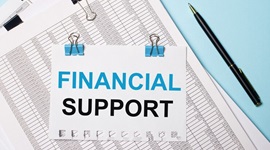
Your credit company make these card limit changes when it spots warning signs in your spending habits. They're trying to protect themselves from risks they see in your file. This sudden change can ruin your budget plans and shopping needs. Your credit score might fall as your debt-to-limit ratio shifts overnight. What was once a safe for big bills now leaves you with a smaller limit.
If you're stuck with urgent costs and a small limit, personal loans might help. Even with poor credit, many lenders offer options for quick cash. These personal loans for bad credit often have fixed rates and set payment plans. You'll know exactly what you owe each month, unlike credit cards with changing balances. Some online lenders approve funds within days for people with bad credit histories.
You can take steps right after a limit drop to save your score from damage. This might even get your old limit back if you play your cards right.
Why Your Card Limit May Drop?
Banks don't always warn you before they make these changes. One day, you're shopping, and the next, your card gets declined.
Credit card companies see how you handle money. Missing even one payment on your card or other loans sends up red flags. They see this as a sign that you might be struggling with cash flow. Your bank gets nervous when it spots late payments anywhere on your report.
Your credit score plays a huge role in these decisions, too. If it dives, expect your limits to follow. This happens when you apply for too many new cards or have high balances elsewhere.
Not using your card can also trigger limit cuts. Credit card companies make money when you spend, so inactive accounts cost them profit. Some will slash your limit if the card is unused in your wallet for months.
Did you lose your job? Got a pay cut? These events might show up in your income reporting. They review this data and adjust your limits based on what they find.
Sometimes, it's not even about you at all. Some economic downturns make banks nervous across the board. They'll update risk policies that affect thousands of customers at once. Your reduced limit might simply be collateral damage from broader market fears.
First Steps to Take Right Away
You can get your phone and open your banking app. The new limit should appear on your main account page. If you can't find it, check your email or regular mail for notices.
You can talk to your bank directly for the fastest answers. You can call the number on the back of your card right away. Or you can also ask the rep to explain exactly why they cut your limit. Many banks will share the specific reasons that led to this change.
While on the call, find out if this cut is final or open to review. Some banks might restore your old limit if you can address their concerns. You take notes during this talk as you'll need them for the next steps.
You can give them the last few months of statements and search for any missed due dates or times you paid less than the full amount. This is also the perfect time to request a free copy of your credit report. You can look for errors or new flags that might have hurt your score.
How Does a Lower Limit Affects You?
A smaller credit limit can create problems. This affects your credit use ratio right away. This number shows how much of your total credit you're using.
Let's say you had a £10,000 limit with a £2,000 balance. Your use ratio was a healthy 20%. If your limit drops to £5,000, that same £2,000 now means you're at 40%. This jump can harm your credit score within weeks.
Credit scores tend to fall when use ratios climb above 30%. The higher this number goes, the more points you'll likely lose. This matters even if you pay your bill in full each month. The credit bureaus take snapshots of your accounts at random times.
The timing of these limit cuts can lead to awkward moments. You might swipe your card for a big purchase, only to face a decline. This happens when the new limit falls below what you've already spent.
These changes shrink your safety net for sudden costs or planned buys. That new fridge or car repair might now exceed your available credit. Many people rely on cards for these larger expenses and spread payments over time. Your travel plans often suffer the most from lower limits. The charges for hotels and rental cars become too costly for you to handle.
Ways to Fix the Situation
You can start by asking your bank to review its decision. Many will take a second look if you make a clear case. Be ready to explain any past issues they might have flagged.
Recent pay stubs or tax forms can help prove your financial status. The lenders want to see that you have a steady cash flow. A new job with better pay might sway them to increase their limit.
You can bring proof of any debts you've paid off since the limit drop. This shows you're working to fix your money picture. They will be able to see that you're taking steps to clean up past issues.
These payment habits will slowly rebuild their trust in you. You can set up auto-pay for at least the minimum due each month. Better yet, pay the full balance whenever possible to avoid interest charges.
You can use your card for small and regular purchases like gas, groceries, and monthly bills, so you can easily afford them. Then, pay these charges off quickly.
Conclusion
Most lenders will work with you if you show good faith efforts. You just have to call your bank, check your reports, and adjust your spending right away. These changes in how you use credit can shift their view of you.
Private lenders offer a lifeline when banks tighten their grip on credit. These loan sources often look beyond just your credit score. They weigh your job history and income in their lending choices.
Many private lenders offer same-day approvals when you're in a tight spot. Their loan terms might fit your needs better than rigid bank rules. You can often borrow exactly what you need without excess fees or charges. Some even report your payments to credit bureaus and help you rebuild your score.
Keep a close eye on all your accounts in the months after a limit drop. Set up alerts for any changes to your credit score or accounts.







-(2).png?sfvrsn=3b7e3050_0)

You've already submitted a review for this item